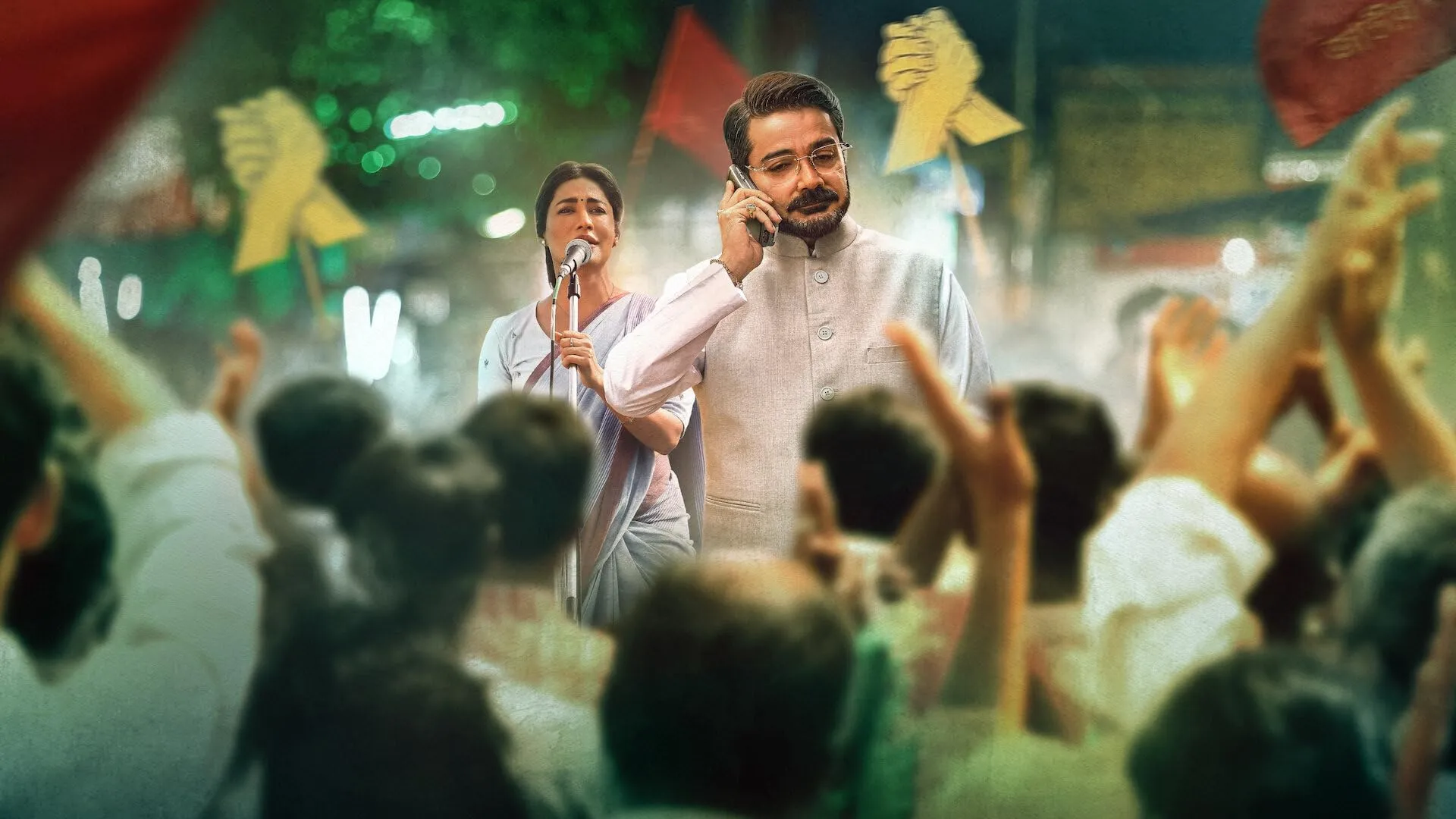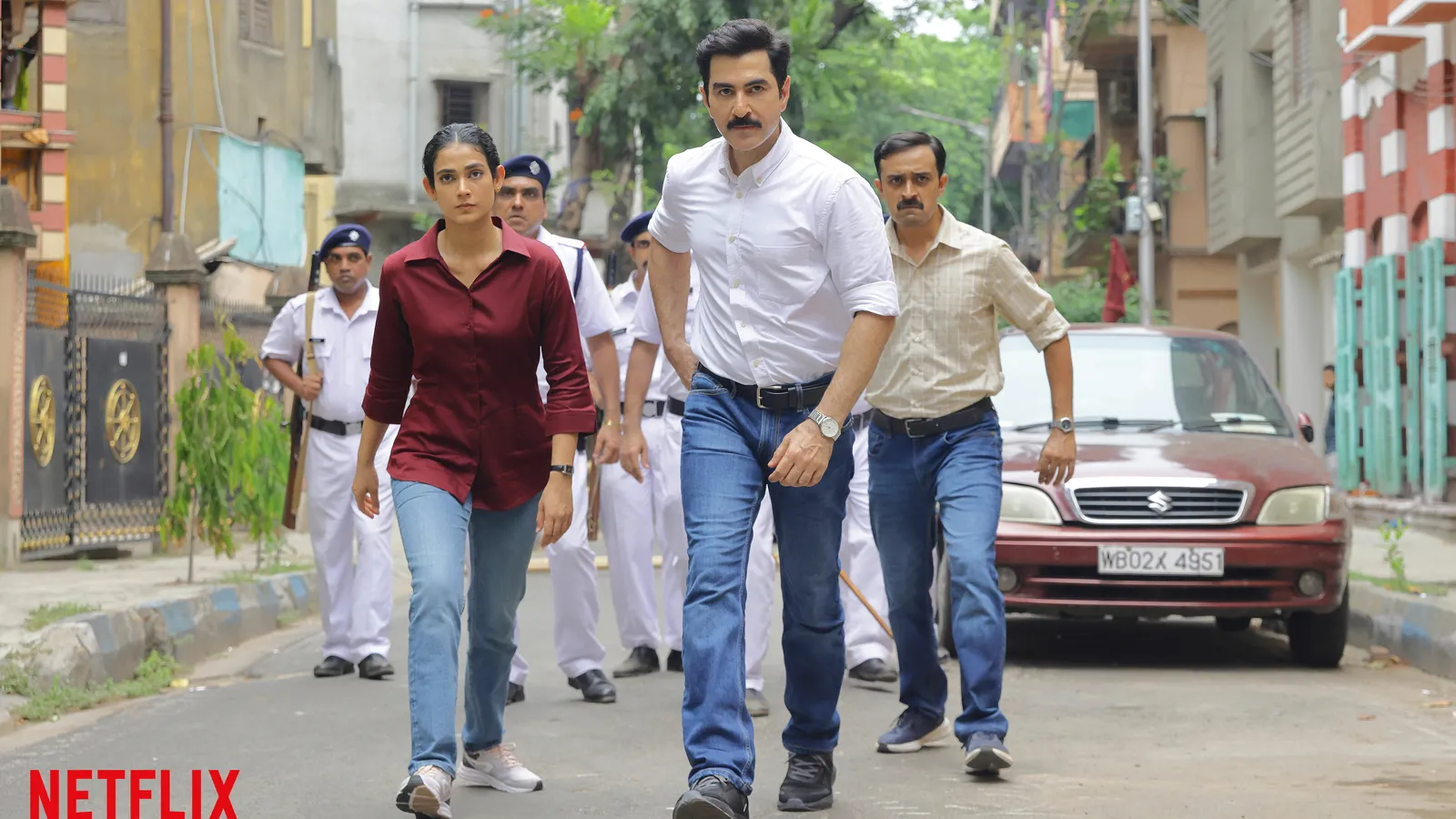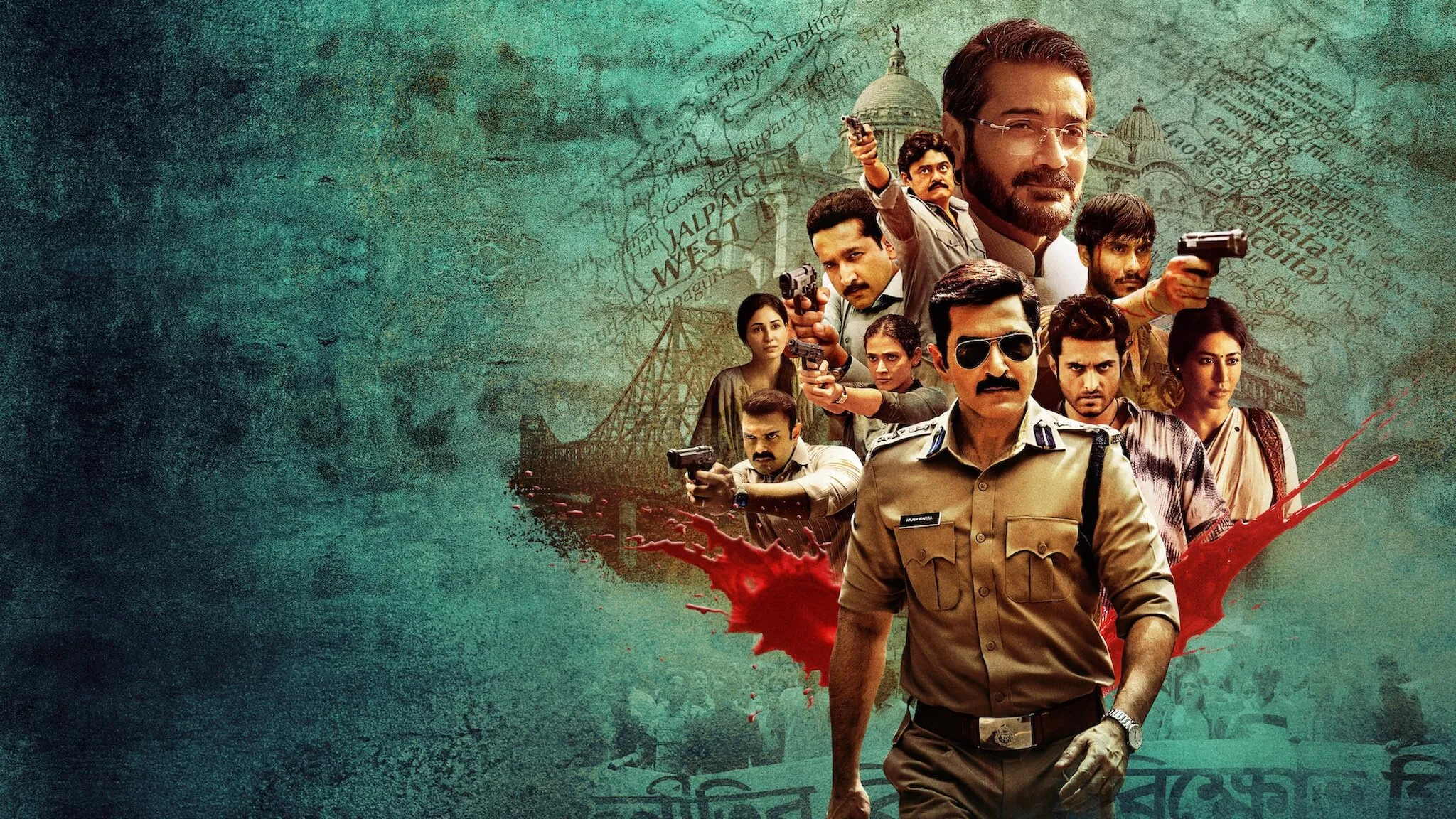Khakee: The Bengal Chapter arrives as a standalone sequel to its Bihar predecessor, transporting viewers back to early-2000s Kolkata. The series opens on a tense highway crash that leaves a prominent shipping magnate dead, instantly exposing the porous boundary between politics and crime. A Special Investigation Team (SIT) is assembled to take down Shankar “Bagha” Barua (Saswata Chatterjee), a gangster whose reach extends into the highest echelons of power.
In casting Parambrata Chattopadhyay as IPS Saptarshi Sinha, the show nods to Bollywood’s tradition of morally driven lawmen, while Jeet’s IPS Arjun Maitra embodies a more modern, global archetype of the flawed hero—an approach that echoes Scandinavian noir’s emphasis on internal conflict. Bagha’s henchmen, Sagor Talukdar (Ritwik Bhowmik) and Ranjit Thakur (Aadil Zafar Khan), bring burdens of loyalty and ambition that evoke the layered criminal families of parallel cinema. On the political front, Prosenjit Chatterjee’s Barun Roy operates like a character from a European political thriller, while Chitrangada Singh’s Nibedita Basak channels early 2000s Bollywood’s rare but striking portrayals of female power brokers.
Visually, Debatma Mandal and Tushar Kanti Ray frame Kolkata in muted earth tones, using handheld camera work during raids to echo neo-realist roots. Sanjoy Chowdhury’s score weaves traditional Bengali percussion with minimalist synth, hinting at global fusion soundtracks in prestige television. Editing cuts between investigative procedure and gangland violence maintain a rhythm that feels both rooted in Indian storytelling and attuned to binge-culture pacing.
Blueprint of Betrayal: Crafting a High-Stakes Narrative
The series opens with a violent car crash that hurls our world into chaos: a shipping tycoon is killed mid-journey, and the very system meant to protect him is revealed as compromised. This brutal moment not only establishes Shankar “Bagha” Barua’s untouchable status but also signals Kolkata’s tangled web of influence. In global thrillers—from Hong Kong crime sagas to British political dramas—the murder of a powerful figure often serves as a lightning rod for corruption; here, it immediately casts doubt on every uniformed ally.
Episodes 1 and 2 lay the groundwork: we meet IPS Saptarshi Sinha as he assembles a Special Investigation Team, only to discover a traitor within. The sudden death of Sinha at midseason jolts the story into fresh territory, mirroring the tonal shift seen in Scandinavian series where a central investigator’s fall reshapes alliances. From Episodes 4 to 6, IPS Arjun Maitra steps in, applying a classic divide-and-conquer strategy borrowed from both Mughal court intrigues and modern procedural dramas. The finale ties loose ends—Bagha’s successors clash, political patrons are unmasked, and a fragile order teeters on the brink of reform.
A recurring confession frame—where a suspect recounts events—is used to punctuate each chapter. While that device creates anticipation akin to Latin American narco-narratives, its repetition can feel weary when the same beats replay. The mole subplot keeps viewers guessing: red herrings appear at every turn, and timing of each reveal echoes the layered misdirection of Japanese crime novels.
Action sequences—raids, ambushes, tense interrogations—are intercut with methodical police work, maintaining momentum much like popular binge-worthy crime shows on streaming platforms. Each episode closes on a strategic hook: one moment, a hidden dossier is uncovered; the next, a trusted lieutenant betrays his own. This pattern sustains eagerness to press “Next.”
Blueprint of Betrayal: Crafting a High-Stakes Narrative
The series opens with a violent car crash that hurls our world into chaos: a shipping tycoon is killed mid-journey, and the very system meant to protect him is revealed as compromised. This brutal moment not only establishes Shankar “Bagha” Barua’s untouchable status but also signals Kolkata’s tangled web of influence. In global thrillers—from Hong Kong crime sagas to British political dramas—the murder of a powerful figure often serves as a lightning rod for corruption; here, it immediately casts doubt on every uniformed ally.
Episodes 1 and 2 lay the groundwork: we meet IPS Saptarshi Sinha as he assembles a Special Investigation Team, only to discover a traitor within. The sudden death of Sinha at midseason jolts the story into fresh territory, mirroring the tonal shift seen in Scandinavian series where a central investigator’s fall reshapes alliances. From Episodes 4 to 6, IPS Arjun Maitra steps in, applying a classic divide-and-conquer strategy borrowed from both Mughal court intrigues and modern procedural dramas. The finale ties loose ends—Bagha’s successors clash, political patrons are unmasked, and a fragile order teeters on the brink of reform.
A recurring confession frame—where a suspect recounts events—is used to punctuate each chapter. While that device creates anticipation akin to Latin American narco-narratives, its repetition can feel weary when the same beats replay. The mole subplot keeps viewers guessing: red herrings appear at every turn, and timing of each reveal echoes the layered misdirection of Japanese crime novels.
Action sequences—raids, ambushes, tense interrogations—are intercut with methodical police work, maintaining momentum much like popular binge-worthy crime shows on streaming platforms. Each episode closes on a strategic hook: one moment, a hidden dossier is uncovered; the next, a trusted lieutenant betrays his own. This pattern sustains eagerness to press “Next.”
Faces of Power and Conflict: A Study in Character Dynamics
Parambrata Chattopadhyay’s IPS Saptarshi Sinha channels the old‐school Bengali cop—reserved, principled, and spoken of in hushed reverence by colleagues. His “washing machine” metaphor instantly cements him as the team’s moral compass, recalling the introspective heroes of parallel cinema. When Saptarshi confronts political interference, Chattopadhyay’s steely gaze and measured delivery evoke equal parts Amitabh Bachchan’s subdued gravitas and the modern restraint of Nordic noir detectives.
By contrast, Jeet’s IPS Arjun Maitra arrives later but quickly commands the frame. His confident planning sessions—unfolding in tight close‐ups—suggest a blend of Hollywood antiheroes and Bollywood flair. Yet intimate scenes with his wife reveal Jeet’s vulnerability: a crack in the polished façade that feels fresh in mainstream Indian thrillers.
Saswata Chatterjee’s Shankar “Bagha” Barua sits atop Kolkata’s underworld with regal menace. His casual alignment with politicians mirrors real‐life power brokers, while Chatterjee’s layered performance shifts from affable insider to cold executioner in a heartbeat—much like European crime lords in series such as Gomorrah.
Young lieutenants Sagor (Ritwik Bhowmik) and Ranjit (Aadil Zafar Khan) evolve from shadowy foot soldiers into threatening rivals. Their tense partnership—highlighted in the warehouse raid sequence—demonstrates a chemistry that recalls sibling duos in classic gangster films, but here it’s steeped in regional authenticity: their clipped Bengali slang and ritualistic pre‐fight prayers root them firmly in place.
Prosenjit Chatterjee’s Barun Roy deserves special note: his soft‐spoken counsel to ministers carries more weight than any loud outburst. When he simply lifts an eyebrow, you sense unseen alliances shifting. Chitrangada Singh’s brief yet pointed speeches as Nibedita Basak illustrate the series’ rare female political presence, even if her screen time limits deeper exploration. Meanwhile, Mahaakshay Chakraborty’s earnest SIT recruit, Pooja Chopra’s steadfast Khushi, Shraddha Das’s resourceful informant, and Aakanksha Singh’s probing narrator all add texture to this world, reflecting Bollywood’s growing ensemble‐driven narratives.
Trust fractures within the SIT smack of classic thieves’‐in‐Paris capers, but here every betrayal carries the weight of real‐world corruption. Politician–criminal alliances shift like pieces on a chessboard, each move underscored by Murshidabad silk drapes and rusted lockups. Even personal bonds—Arjun’s strained marriage, Sagor’s devotion to his wife—remind us that beyond power plays, ordinary lives hang in the balance.
Directing Tension: Vision, Structure & Dialogue
Neeraj Pandey’s script maintains the core theme of personal integrity against systemic rot, echoing his Bihar installment, but resets the stakes within Kolkata’s labyrinthine politics. Under Debatma Mandal and Tushar Kanti Ray, scenes shift from sardonic stillness—long takes in rain-soaked alleys—to stylized slow motion during key confrontations, producing a tension that pairs documentary-level grit with the polish of streaming crime dramas worldwide.
The writers juggle three strands—SIT’s police procedural, Barua’s manipulative power plays, and officers’ private struggles—using clear signposts at every turn. Transitional devices like on-screen dates or the recurring rumble of an overhead train let plotlines interlock without confusion. This precision in scene transitions mirrors European ensemble thrillers, where complex narratives unfold through visual cues rather than blocks of exposition.
Memorable turns of phrase, such as Saptarshi’s “washing machine” metaphor, slice through procedural jargon to reveal character ethos—an economy of language often seen in British crime series. The code-switch between Bengali and Hindi aims for local authenticity while courting a pan-Indian audience. Though some shifts feel calculated for non-Bengali viewers, actors like Chattopadhyay and Chatterjee anchor every line with genuine regional inflection and cultural texture.
Set pieces demonstrate skillful spatial choreography: the warehouse raid opens in a single take—recalling Korean noir—and then fractures into quick edits during the gun battle, underscoring chaos. Hand-to-hand confrontations land with bone-deep impact, and low-angle framing of gunshots magnifies each moment. This graphic approach heightens narrative stakes but occasionally flirts with excess, reflecting the influence of high-end Western thrillers more than restrained Bollywood tradition.
Frame by Frame: Kolkata’s Noir Aesthetic
The series bathes early-2000s Kolkata in muted ochres and charcoal grays, capturing a city caught between industrial grit and political glamour. Crowded street bazaars and neon-lit night markets dissolve into the shadowy interiors of abandoned warehouses, evoking the urban underbelly of classic Hong Kong thrillers while remaining rooted in Bengal’s colonial-era architecture.
During raids, handheld cameras crest over tables strewn with ledgers, channeling the urgency of modern documentary style. In contrast, steady-cam shots across the Howrah Bridge convey a sense of scale and history, much like the wide tracking shots in European crime epics. Costume details—crisp police uniforms, time-worn sarees—add period authenticity, reminding viewers that this is a world governed by both formal protocol and informal loyalties.
Sharp cross-cuts link IPS operatives poring over dossiers with Bagha’s lieutenants executing a midnight hit. Montage glimpses—newspaper clippings, speeding trains—compress weeks of investigation into seconds, a technique borrowed from Japanese thrillers to advance momentum without sacrificing clarity. Time-jumps are signposted by ink-blot title cards, preventing confusion as power dynamics shift.
Sanjoy Chowdhury’s score weaves tabla rhythms with sparse electronic pulses, creating a sonic bridge between traditional Bengali motifs and global noir soundscapes. Jeet Gannguli’s title theme resurfaces during key turning points, its simple flute melody underscoring moments of moral reckoning. Diegetic elements—echoing gunshots in alleyways, vendor calls at dawn—anchor the story in lived reality, forging an immersive texture that resonates beyond the screen.
Under the Shadow of Power: Themes, Tone & Setting
Khakee: The Bengal Chapter lays bare the intricate alliance between the ruling party, the police force, and Bagha’s criminal empire. Early scenes—ministers ostensibly condemning a tycoon’s murder while secretly briefing gangsters—evoke real-world parallels to West Bengal’s early 2000s political climate, when patronage and impunity ran deep. This nexus mirrors global narratives like Gomorrah, where systemic rot is normalized at every echelon.
The series interrogates “encounters”—extrajudicial killings framed as justice—through Arjun Maitra’s divide-and-rule tactics. His decision to pit Sagor against Ranjit recalls classic vigilante arcs in American crime cinema, yet the moral cost is far murkier here: each calculated death raises questions about whether reform can emerge from violence.
Graphic raids—splintered bullet casings, smeared blood on warehouse walls—serve more than shock value. They underscore Kolkata’s volatility, echoing Bollywood’s fearless embrace of corporeal storytelling in parallel films like Satya. Yet the series tempers excess with moments of stillness: a lingering shot on a fallen trumpeter’s mask speaks volumes beyond gore.
Kolkata’s early-2000s soul comes alive in every frame: tram tracks cutting through monsoon-drizzled streets, Bengali radio blaring protest songs, saffron-stained temple paraphernalia lining dimly lit alleys. These textures anchor the series in a specific time and place, offering both local authenticity and universal resonance.
Parting Insights & Viewing Guide
The series excels with its slick production design, immersive cinematography, and powerhouse leads—Parambrata Chattopadhyay and Saswata Chatterjee deliver performances that anchor the political-crime drama in emotional truth. At its best, the writing balances procedural tension with cultural textures, and the score fuses Bengali folk rhythms with modern noir motifs.
Some narrative devices—particularly the repeated confession flashbacks—feel overused, and a few supporting characters fade into the background when the stakes grow large. Viewers who appreciate Asian thrillers like Gomorrah or Paatal Lok will find Khakee: The Bengal Chapter right in their wheelhouse.
To maintain focus on its intricate plotting and character arcs, it’s wise to watch in two-episode sittings, giving time for each twist to settle. This series offers a rich dive into corruption’s many faces and delivers enough intrigue to reward attentive viewing.
Full Credits
Directors: Debatma Mandal, Tushar Kanti Ray
Writers: Neeraj Pandey, Debatma Mandal, Samrat Chakraborty
Producers: Shital Bhatia, Neeraj Pandey
Cast: Jeet (Arjun Maitra), Prosenjit Chatterjee (Barun Roy), Chitrangda Singh (Nibedita Basak), Ritwik Bhowmik (Sagor Talukdar), Aadil Zafar Khan (Ranjit Thakur), Saswata Chatterjee (Shankar Barua “Bagha”), Parambrata Chattopadhyay (Saptarshi Sinha), Mimoh Chakraborty (Himel Majumdar), Pooja Chopra (Khushi Maitra)
Directors of Photography (Cinematographers): Tushar Kanti Ray, Arvind Singh, Tarashree Sahoo, Souvik Basu
Editor: Praveen Kathikuloth
Music: Jeet Gannguli (Songs), Sanjoy Chowdhury (Background Score)
The Review
Khakee: The Bengal Chapter Season 1
Khakee: The Bengal Chapter plunges into Kolkata’s power corridors with commanding lead performances, slick visuals, and a tense cat-and-mouse narrative. Its repeated flashback device and uneven secondary roles slightly dilute the impact, but the series still marries regional authenticity with global thriller style. Best absorbed in concentrated viewing, it rewards patience with memorable characters and high-stakes intrigue.
PROS
- High-impact lead performances that ground the political-crime drama
- Authentic portrayal of early-2000s Kolkata through visuals and sound
- Taut procedural scenes balanced with cultural details
- Stylish action set pieces with clear spatial choreography
- Score that fuses Bengali motifs and modern noir elements
CONS
- Repeated flashback device can feel over-used
- Some secondary characters lack depth in later episodes
- Language shifts between Bengali and Hindi occasionally jar
- Graphic violence borders on excess in spots




















































